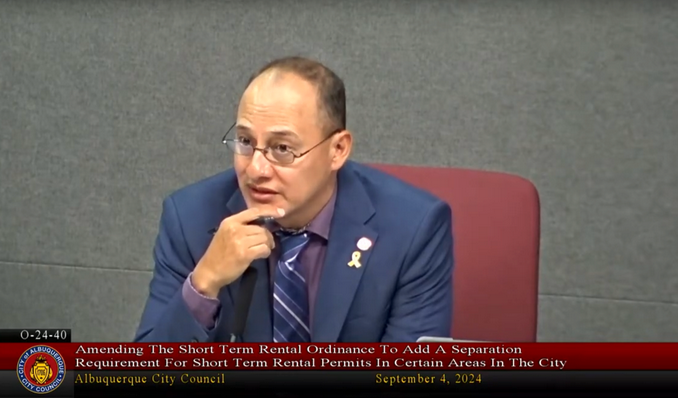Albuquerque City Council members Joaquín Baca and Nichole Rogers drafted a bill that would impose restrictions on short-term rental permits in their districts intended to address housing shortages by increasing inventory for full-time residents. The bill was defeated in a 3-6 vote during the Sept. 4 city council meeting.

The bill proposed that property owners could not receive a short-term rental permit if another property within 330 feet already has one. The affected areas would have included downtown, Barelas, Martinez Town, Huning Highlands, Old Town and Nob Hill.
Out of the 15 people who signed up to comment, 13 ardently opposed it — all property owners with a STR business. After listening to their concerns, Baca emphasized the restrictions would not apply to any existing STR permits.
“I am protecting your permits right now,” Baca said. “But we also have other issues beyond our own interests, and I need your help — to help our community.”
Carl Vidal, a board member with the NM Short-Term Rental Association, cited data from a 2023 STR Economic Impact Study that showed Albuquerque’s STR industry had a $145 million economic impact and generated $11.5 million in tax revenue. Vidal argued that restrictions would empower hotel corporations to raise nightly rates and suggested that could lead to a decline in tourism.
Kris Leslie-Curtis, president of the NM Short-Term Rental Association, said STRs are mostly residential small businesses, with no evidence linking them to the affordable housing crisis.
Other public commenters emphasized the importance of equal opportunity and free enterprise, saying the bill would harm younger generations and individuals looking to build wealth. Some argued that the STR market has spurred positive gentrification and continues to ensure neighborhoods preserve upkeep and character. The market also supports tourism which is great for local businesses.
Speakers emphasized that short-term rentals supply temporary housing for residents working in film and construction, while others underscored concerns for potential job loss for those working in Airbnb house cleaning and management.
Stacey Seidel, a local contractor, suggested city council should focus on enforcing the current ordinance and address the 40% of STR owners who are currently operating without a permit.
A city attorney said she will examine the enforcement section of the short-term rental ordinance that is currently on the books and will investigate if noncompliance letters are being sent to permit-less short-term landlords.
For now, Albuquerque’s current and aspiring short-term rental owners breathe a sigh of relief. But as the dust settles on the council’s vote, the question remains: What, if any, ordinance can balance economic growth, free enterprise and the city’s dire housing needs?
Hey everyone,
My name is Richard, but you can call me Ricky.
Please don’t mind me. I am very new to everything here, so I apologize for any errors.
A little about me: anyone who knows me knows I am a huge nerd. A lot of my work delves into geek and pop culture. Most of my work delves into video games, rock bands, comic books, and reviews on the latest and greatest.
